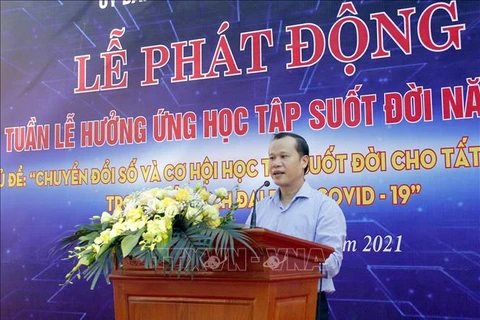Bac Giang (VNA) – Bac Giang city in the northern province of the same name will mobilise all resources to develop in the direction of green and smart urban area, Chairman of the municipal People’s Committee Dang Dinh Hoan has said.
To realise the target, the city has set to basically fulfil criteria for the first-tier urban area by 2025 and be recognised as one by 2030.
It aims to raise per capita income of local residents to 8,500-9,000 USD a year and call for more than 100 trillion VND (4.41 trillion USD) in social sources for development.
Bac Giang city will invest in and build two or three green and smart urban areas, two to four three- and five-star hotels, two to three nightlife economy zones and a 100-ha park.
It aims to be among top 10 provincial cities of the country in terms of smart urban area index; and raise the digital economy's share in the gross regional domestic product to about 30 percent and at least 20 percent in each sector.
The city will work to put power lines underground, build more parks, recreation sites and garbage depots in the city, and invest in a waste-to-energy plant.
It is set to bolster management and supervision over the quality of water in rivers and lakes, as well as the collection and treatment of wastewater at urban areas, industrial parks and clusters. Due attention will be paid to firms’ discharge activities and environmental pollution treatment at craft villages, and safety and order in urban areas.
The application of new technologies in agricultural production will be promoted and a smart urban management centre will be set up to help with management work.
A security camera system will be installed in the city's central area, key traffic spots and public places. Digitalisation in archive is due to be carried out across all fields, together with e-government applications.
In the coming time, Bac Giang city will mobilise all resources to take the lead in digital transformation, particularly in information technology (IT) and communications to meet demand for the building of the digital government and the city’s socio-economic development.
Priorities will be given to investment in and development of sectors that generate high added value like production of hardware and software, and support services of IT and communication, with an aim to create a smart urban foundation for Bac Giang city.
The city, spanning 66.77 sq.m, has 16 administrative units of communal level. It is the political, economic and cultural hub of Bac Giang province.
Situated on an artery road linking Hanoi with Lang Son, and the Huu Nghi international border gate, the city has a favourable location on an economic corridor running through the four localities of Lang Son, Hanoi, Hai Phong and Quang Ninh.
Bac Giang city has made strides over the years, with an average annual economic growth rate in the 2011-20 period hitting 11.7 percent. Meanwhile, budget collection surged 38 percent against the estimates. Urban planning and management have improved as infrastructure has been upgraded and rural area given a facelift.
Many major constructions and projects have been completed and helped improve urban quality and landscape in the city, notably the Hanoi-Bac Giang and Bac Giang-Lang Son expressways, the Dong Son bridge and the southern urban area, among others.
A number of big investors such as Toyota, Honda and Hyundai have channeled investment into the city. Bac Giang is now home to about 100 cooperatives and more than 4,000 firms, of them 1,670 are newly established ones with registered capital worth 7.54 trillion VND. There are 40 foreign direct investment projects totalling over 236 million USD.
Bac Giang city has to date earned 71.27 out of 100 points to become first-tier urban area./.
























